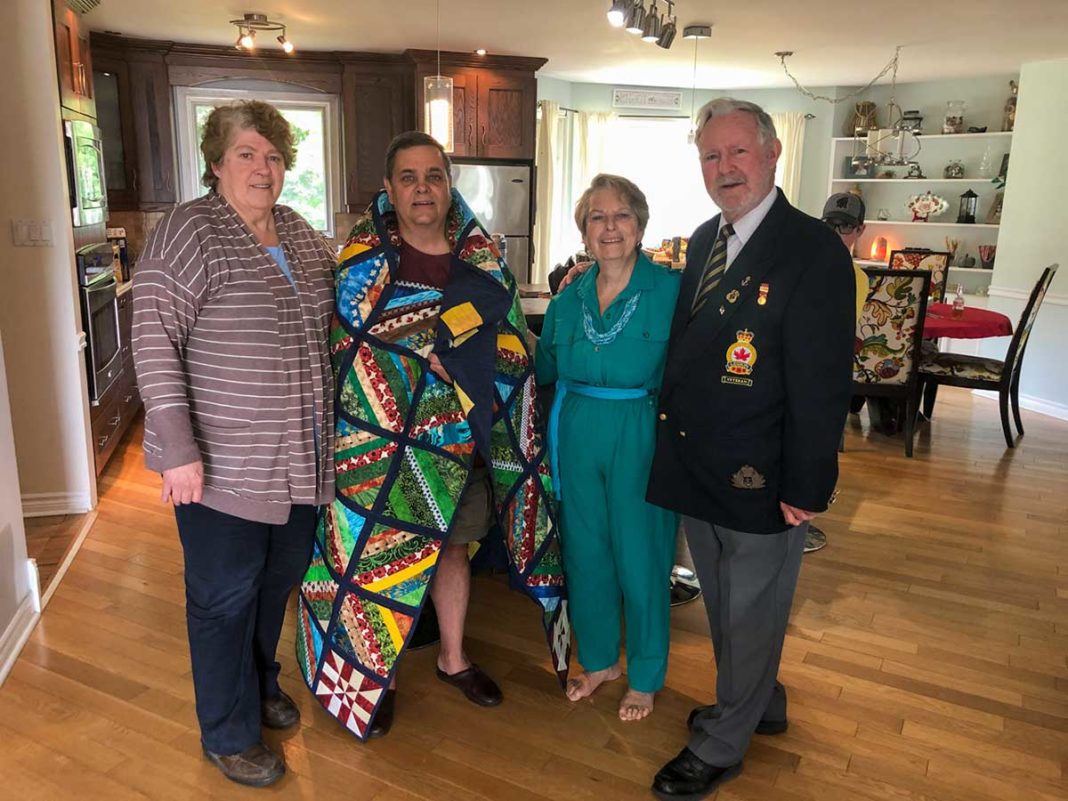SHEGUIANDAH – Sgt. Patrick Huard, who resides in Sheguiandah with his wife Sandra and son Alex, was given a loving embrace from a grateful nation recently when he was presented with a Quilt of Valour from the Elliot Lake Quilt Guild.
Judy Millard made the trip to Sheguiandah on Father’s Day to present the quilt to Sgt. Huard alongside his nominator, Darla Hennessy, herself a veteran of the armed forces.
Ms. Millard, with help from Ms. Hennessy, wrapped the quilt around Sgt. Huard, a recently retired member of the Canadian Armed Forces who lives with post-traumatic stress disorder (PTSD) as a result of his work with the military.
“It’s a thank you for everything done by him, and the forces, for us,” Ms. Millard shared. “It’s a way of us letting you know your service was appreciated.”
Sgt. Huard told those present at the gifting that he was humbled by the gesture. The quilt is bright and colourful and contains poppies and maple leafs as an homage to his service.
Those eligible for a quilt are “Canadian Armed Forces members, past or present, who are ill or injured as a result of their service to Canada,” the website explains. As well, those who automatically qualify for a Quilt of Valour are those who served in WWII, Korea, Bosnia, Rwanda and the Gulf Wars.
Ms. Hennessy’s husband Howard was Sgt. Huard’s boss in Ottawa during his time with the military police, and who eventually became a good friend. She told The Expositor that when she heard of Quilts of Valour, she immediately thought of Sgt. Huard, who has served in many countries, including Rwanda.
In a sit-down interview with this newspaper following the presentation of the quilt, Sgt. Huard told The Expositor that he retired two years ago, after 40 years in the military and public service, serving in both the airborne division and as a military policeman.
Sgt. Huard has served in Rwanda, Kenya, Tanzania, Uganda, Israel, Syria and from coast to coast in this nation. He met wife Sandra while the pair were stationed in Petawawa in the 1980s. Ms. Huard served eight years in the military too.
He says his time spent in Rwanda and Syria, as well as his work as a police officer, has caused his PTSD. “Rwanda had a big part to do with my PTSD, and my career as a whole, because I never had a chance to escape,” he explains. “Most soldiers come back and have a bit of a reprieve, I didn’t.” If he flew back from a mission on a Friday night, he was back reporting for duty on Monday, despite the horrors he might have witnessed. “I think my PTSD is cumulative.”
In 1994, after years of cultural tensions between the majority Hutus against the minority Tutsis, Rwandan president Juvenal Habyarimana (a Hutu) was killed after his plane was shot down. This sparked a wave of violence that saw over 800,000 Rwandan civilians, mostly Tutsis, massacred.
Many of the Canadians deployed to Rwanda as part of the United Nations Assistance Mission for Rwanda suffered from PTSD, including the Canadian general who led the United Nations campaign, Romeo Dallaire, and whose pleas for help from the international community fell on deaf ears.
He attributed some of his PTSD to “the lack of support given to the Rwandan mission and the sense of helplessness felt.” Sgt. Huard was there for six weeks, and within that time, 650,000 people were slaughtered. There was no hiding the atrocities done.
A few years ago, the sergeant’s family started to notice behaviours that pointed to PTSD. It all came to a head when he attempted to go to work, but had to turn around and come home. The autumn following his diagnosis was largely spent sleeping, he admits.
“I have my good days and my bad days,” he shares. He points to his supportive family and his dogs as his biggest supports, as well as the move to Manitoulin and the family’s view of Bass Lake. “Living on the water helps, and the slow pace of the Island.”
The sergeant says he sometimes has a hard time relating to civilians, after all that he’s seen. Hearing complaints about the mundane seem incredibly trivial to him and so making connections with people from non-military backgrounds continues to be a challenge.
Despite the bad days, Sgt. Huard says the military is the best thing to have ever happened to him.
“I’ve worn a uniform since 1974,” he shares. “I was in the Sea Cadets as a teen, then I joined the reserves, then the forces. (The military) gives you education, training, purpose.”
Sgt. Huard stated that anyone thinking about the military, or who has graduated from school and isn’t sure what to do, should give it a try. “Everything I have today, I owe to the military. There’s no more worthy place to work.”
Sgt. Huard still lives with his PTSD every day and sees his family doctor regularly. He also has high praises for the Royal Canadian Legion, especially Dominion Command, for their work with veterans.
“We’re truly blessed. Canadians have to start understanding, we live in the best country in the world.”
For more information on Quilts of Valour, visit their website at quiltsofvalour.ca.
The Expositor’s annual Remembrance Day edition will feature an in-depth interview with the Huards on their time served with the Canadian Armed Forces.





